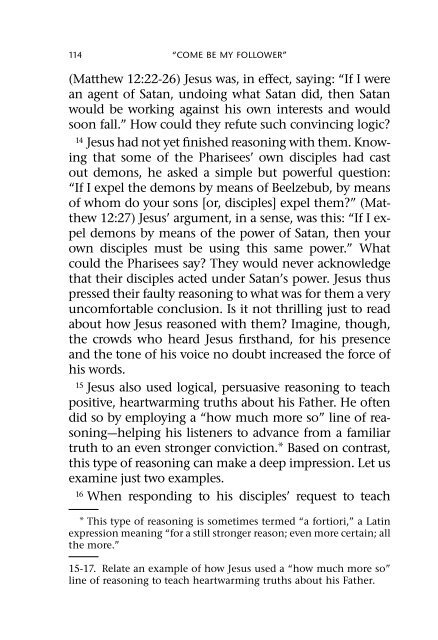Come Be My Follower - Jehovah's Witnesses Official Media Web Site
Come Be My Follower - Jehovah's Witnesses Official Media Web Site
Come Be My Follower - Jehovah's Witnesses Official Media Web Site
You also want an ePaper? Increase the reach of your titles
YUMPU automatically turns print PDFs into web optimized ePapers that Google loves.
114<br />
“COMEBEMYFOLLOWER”<br />
(Matthew 12:22-26) Jesus was, in effect, saying: “If I were<br />
an agent of Satan, undoing what Satan did, then Satan<br />
would be working against his own interests and would<br />
soon fall.” How could they refute such convincing logic?<br />
14 Jesus had not yet finished reasoning with them. Knowing<br />
that some of the Pharisees’ own disciples had cast<br />
out demons, he asked a simple but powerful question:<br />
“If I expel the demons by means of <strong>Be</strong>elzebub, by means<br />
of whom do your sons [or, disciples] expel them?” (Matthew<br />
12:27) Jesus’ argument, in a sense, was this: “If I expel<br />
demons by means of the power of Satan, then your<br />
own disciples must be using this same power.” What<br />
could the Pharisees say? They would never acknowledge<br />
that their disciples acted under Satan’s power. Jesus thus<br />
pressed their faulty reasoning to what was for them a very<br />
uncomfortable conclusion. Is it not thrilling just to read<br />
about how Jesus reasoned with them? Imagine, though,<br />
the crowds who heard Jesus firsthand, for his presence<br />
and the tone of his voice no doubt increased the force of<br />
his words.<br />
15 Jesus also used logical, persuasive reasoning to teach<br />
positive, heartwarming truths about his Father. He often<br />
did so by employing a “how much more so” line of reasoning—helping<br />
his listeners to advance from a familiar<br />
truthtoanevenstrongerconviction. Based on contrast,<br />
this type of reasoning can make a deep impression. Let us<br />
examine just two examples.<br />
16 When responding to his disciples’ request to teach<br />
This type of reasoning is sometimes termed “a fortiori,” a Latin<br />
expression meaning “for a still stronger reason; even more certain; all<br />
the more.”<br />
15-17. Relate an example of how Jesus used a “how much more so”<br />
line of reasoning to teach heartwarming truths about his Father.






